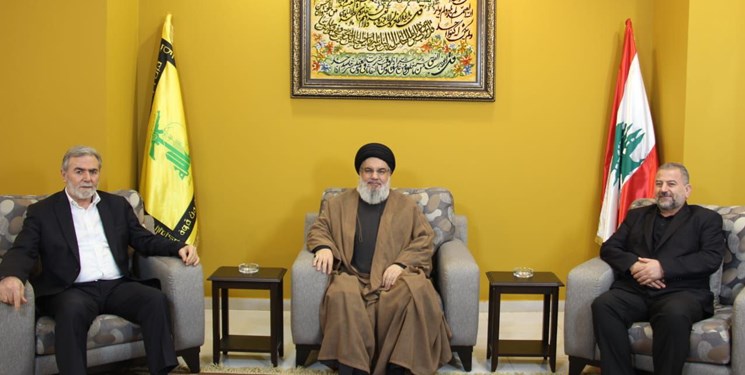Hasan Hanizadeh told the Strategic Council on Foreign Relations that the recent meeting between the leaders of the Palestinian movements and Seyyed Hassan Nasrallah, the Secretary General of Hezbollah in Lebanon, was held within the framework of the existing coordination between the leaders of the resistance in Lebanon and Palestine. Considering the recent threats the Zionist regime has made against the people of Palestine, Syria, and Lebanon, these consultations need to be analyzed to create a new mechanism to monitor developments and make coordinated decisions to confront the Zionist regime.
Hanizadeh was referring to the recent tripartite meeting of “Seyyed Hassan Nasrollah” the Secretary General of Hezbollah, “Ziyad Al-Nakhleh,” the Secretary General of the Islamic Jihad Movement, and “Saleh Al-Arouri,” the Vice-Chairman of the Politbureau of the Hamas Movement in Beirut.
He stated that the internal crises in the Zionist regime, the gap between its political currents, and the uprising of black Ethiopian Jews who immigrated to the occupied territories have put Netanyahu’s cabinet in a critical situation.
He added that experience has shown that whenever the Zionist regime faces an internal crisis, efforts have been made to transfer this crisis abroad through regional military movements. For this reason, there is a possibility that this regime will attack Lebanon and Syria. This issue requires the strengthening of consultations between the leaders of Palestinian movements and Lebanon’s Hezbollah.
This analyst of West Asian issues called the results of the meetings between the leaders of the resistance in Lebanon and Palestine important and considered them a strategy to neutralize the movements of the Zionist regime.
Hanizadeh added that the US has made movements in the region in the past months and has also taken measures in Syria to intensify disturbances. The recent incitement of the Kurdish and Arab ethnic groups in the eastern regions of Syria, the repeated attacks of the Zionist regime’s army against Syria and the assassination of influential figures of the Palestinian movements show that this regime is trying to create a crisis in the region in coordination with the United States; for this reason we have seen an increase in movements, consultations and coordination among the leaders of the resistance.
Hanizadeh, recalling that the Zionist regime has threatened to assassinate resistance leaders in a situation where it is facing numerous internal crises and security challenges inside the occupied Palestine, especially the West Bank, as well as external threats, added that this meeting is after Netanyahu’s threats in his cabinet meeting of the Zionist regime regarding the pursuit of Palestinian resistance leaders in the West Bank, Gaza Strip, and other places. In fact, the leaders of the resistance with this meeting tried to demonstrate the highest level of coordination among themselves, both in Palestine and in the region, and to emphasize that these threats of the Zionist regime, which are not new, will not weaken the will of the resistance and that the resistance front is ready to deal with this.
He stated that the resistance sent the message that any movement of the Zionist regime against the resistance front will be met with a multilateral and tough response that does not involve confrontation on several fronts at the same time, and stated that now there are differences between the team of Joe Biden, the President of the United States, and Netanyahu’s government. Strategically, the US and the Israeli regime do not have root differences, but the aggressive behavior of Netanyahu’s cabinet has had many costs for the US and the West. In this situation, the US is trying to prevent the Zionist regime from entering the conflict directly, and the experience of Israel’s defeat in the 33-day war of 2006 is still interpreted as the US defeat.
This expert on West Asian issues stated that the Israeli regime is seeking to create tension with the Palestinian resistance groups and Hezbollah has shown that it will support the resistance groups in the Gaza Strip in that situation.
Hanizadeh added that the resistance groups are increasing the cost for any possible stupidity on the part of Netanyahu’s cabinet. In this case, Hezbollah, Gaza, the West Bank and even the territories occupied in 1948 will act against the Israeli regime.
Hanizadeh emphasized that the US desired the situation to get calm until the 2024 elections, but now the crisis in the occupied territories has intensified, and the massive demonstrations against Netanyahu for the past 36 weeks have created a series of difficult situations.
At the same time, he considered the differences between the leaders of the anti-Zionist struggle with the cabinet of Mahmoud Abbas and the PLO to be radical, and at the same time, he said that the policy of the leaders of the Palestinian movements is based on securing the interests of the resistance and Islamic and national goals.
Hanizadeh emphasized that tactical operations have turned into strategic operations in the occupied territories, so during the past two years, the Israeli regime has carried out military attacks on Palestinian areas in Gaza, the West Bank, and East Beitul-Moqaddsa. Still, it has failed due to the resistance of militant movements.
This analyst of West Asian issues pointed to the Israeli media’s analysis that the army of the Zionist regime has failed to break up the complex triangle of Lebanon, the West Bank and Gaza, adding that “the Israeli media believe that Saleh al-Arouri, the deputy head of the politburo of Hamas movement in Gaza, made these arrangements. For this reason, we have witnessed the Israeli regime’s threats against him.
Hanizadeh emphasized that it seems that there is now an excellent experience between Hamas and Islamic Jihad and other Palestinian movements and Hezbollah, and this coordination to define a common fighting mechanism can lead to the defeat of the Zionist regime.










0 Comments